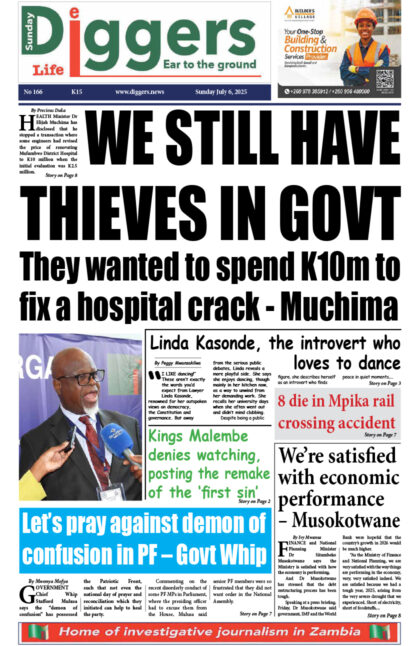ENERGY expert Bornface Zulu says the delay to conclude the Electricity Cost of Service study will continue to subject Zambians to high electricity tariffs.
Commenting on remarks by Energy Regulation Board (ERB) Chairperson Jane Kabwela that the Electricity Cost of Service Study would only be completed by the end of 2021, Zulu said there was need to conclude the survey as quickly as possible in order to understand the challenges citizens faced by buying high electricity tariffs.
“The impact means that we are going to run with the current electricity tariffs which have negatively impacted on the cost of living for the Zambian people because they are high. So if this survey is not conducted in adequate time, you will find that we will still be running on the same amount of tariffs that we are running. Additionally, these tariffs will have a negative impact when it comes to the economy. Our economy right now is staggering due to the fact that these tariffs that were recently introduced have already negatively impacted consumers because they are much on a higher cost,” Zulu said.
“This will mean that the cost of livelihood for the ordinary Zambian is hiked at the end of the day. So solutions have to be put up. The negative fact is [that if] they do not take this survey as quickly as possible, they will not know or understand what an ordinary Zambian is going through on a daily basis by buying these high electricity tariffs from ZESCO. So the tariffs need to be reduced at any given cost and this process must speed up.”
Zulu added that the majority of the population was dependent on the national grid, therefore it would be nearly impossible to significantly reduce electricity tariffs.
“Actually right now, we are running below par because we need to produce sufficient electricity for our people to survive and for us to grow our economy. Our economy is staggering right now due to the fact that we have got high tariff rates for buying these tokens therefore people cannot afford them. Additionally, people are over-dependent on the national grid. So that gives you a scenario, do you think that the current capacity government has put in place will attract any tariffs adjustment at any time soon? They cannot be reduced due to the fact that there is a huge dependency on the national grid and there is a huge dependency of people that are not connected to the grid,” Zulu said.
“With that said, it is not possible to see a reduction in electricity tariffs. Today an ordinary Zambian is not able to buy electricity. People that are living in shanty compounds cannot afford the current tariffs. Let us say today I bought 200 units which only last a week, so people will easily buy charcoal which will last a month. This needs to be discouraged because it is destroying our ecosystem. Our tariffs have been hiked and exaggerated.”
Zulu noted that the investment in the energy sector was not sufficient to lower the cost of production or the cost of electricity tariffs in the country.
“The investment that has been put in right now is not sufficient enough to lower the cost of production or lower the cost of electricity tariffs in the country. You have to understand that we are producing 2800 megawatts and this is only given to 31 percent of our general population. Today we are talking of a Zambia that has got more than 22 million people approximately and only 31 percent have got access to electricity. 64 percent of people living in urban areas have access to electricity while the other 36 percent do not have electricity. For people living in rural areas, only four percent have access to electricity. Now look at the other 96 percent, they do not have electricity. So we are talking about 69 percent of our general population not being connected to the national grid which is a huge amount,” he said.
Zulu said there was need to invest in alternative sources of energy which would increase power generation.
“So government has to look for alternative sources because the over-dependence on hydro power is not going to be a solution for us. Then we must also look into building other dams in the Northern part of Zambia. Luapula Province for example, we have to look at that so that we can produce more electricity that can facilitate in the long run and reduce tariffs and reduce the cost at which we are going to be distributing this electricity to the people. You will find that we are not looking at other alternative sources of energy that can atleast reduce these tariffs. What is happening right now is that Zambia is currently producing about 2800 megawatts and these megawatts, 80 percent of it is only coming from hydro. Hydro on the other hand has a high maintenance cost that is needed and also runs on a lot of cables. This means that they will have to hike the tariffs in order for them to continue running these systems because it is expensive to run them,” said Zulu.
“With alternative sources, you will reduce the amount of cable, reduce the amount of material as well as manpower. You can install solar panels on any home, therefore, allowing an ordinary Zambian to produce their own electricity at a cheaper cost and with better solutions in the long run. This will also allow us to go green as a country and reduce the amount of electricity being consumed. This will in turn also cut the cost of buying electricity from the power utility company. The power utility company will also produce enough electricity to send out of the country therefore reducing the tariffs in Zambia.”



















